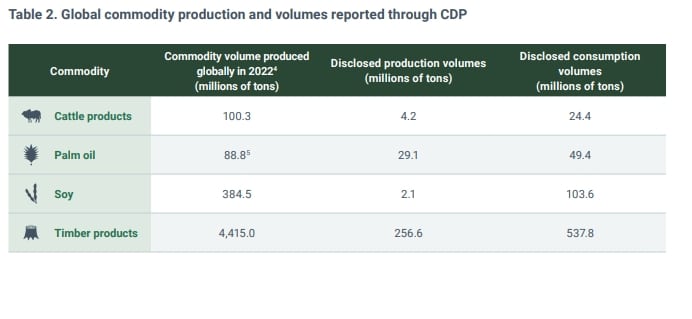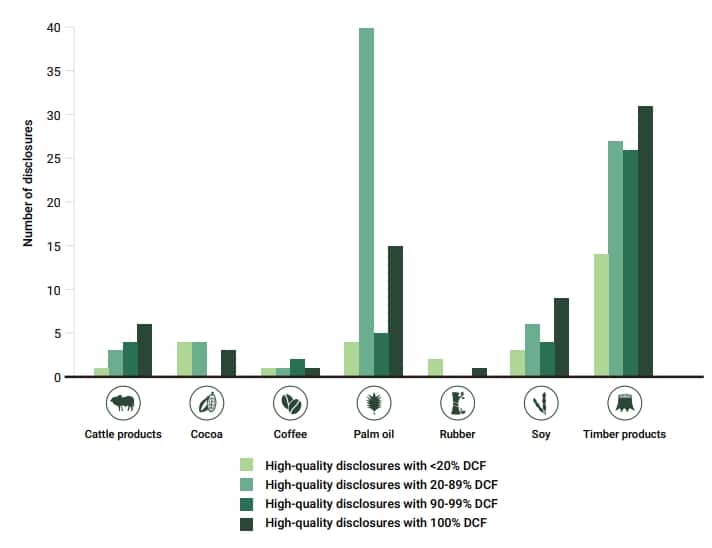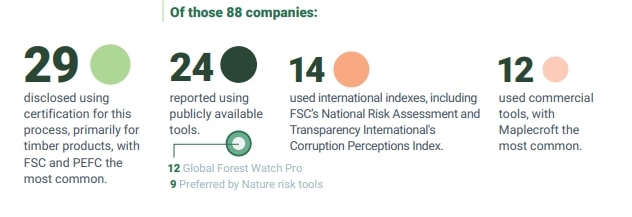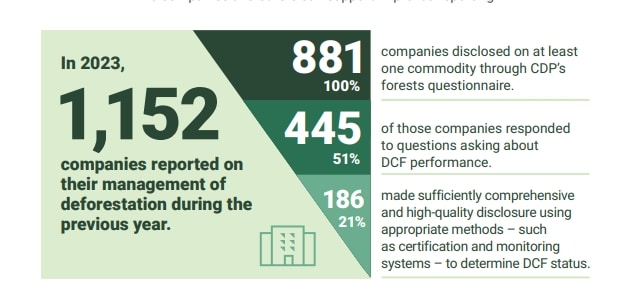As global governments beef up environmental regulations and the world’s biggest banks push “nature-positive” frameworks, agricultural and timber commodities are under pressure to rid supply chains of deforestation.
While “deforestation-free” is possible, achieving a “100% deforestation-free” supply chain is still highly problematic for the vast majority of businesses connected to “at-risk” commodities.
That is according to a new report, which claims that just 7% of companies surveyed have achieved a 100% deforestation or conversion-free supply chain in at least one commodity.
Of those that have achieved “100% deforestation-free” supply chains, timber products (48% of all 100% deforestation-free) are making the most progress, ahead of Palm Oil, Soy, Cattle products, Coffee, and Rubber.
The findings come from “Time for Transparency,” a report prepared by The Accountability Framework Initiative (AFi) and CDP, which manages the world’s largest environmental database.

It assessed information from 881 global companies that disclosed information about commodities – supplying 1,498 different commodity-specific disclosures (70% connected to timber supply chains).
Of those assessed, just under 40% came from Europe, 35% from Asia, 32% from North America, 21% from Latin America and less than 3% from Oceania and Africa – with a strong bias towards the manufacturing and retail, rather than the primary process end of the supply chain.
According to Lah Samberg, the Lead Scientist for AFi, who launched the new report at a webinar yesterday, the new data reinforces the challenges companies face ahead of the EUDR: “The data demonstrates that companies need to invest in effective monitoring and control systems to address deforestation and conversion associated with their operations and suppliers.”
Timber-based products lead the way to 100% deforestation-free.
Despite the shortcomings, the findings reveal positive signs ahead of the EUDR rollout later this year. In addition to the 66 companies that could demonstrate 100% deforestation-free supply chains, 41 businesses reported that between 90% and 99% of their value chains were deforestation-free.

Wood Central understands that the vast majority of these supply timber-based products, aided by private forest certification schemes—like PEFC, FSC, SFI (in the United States), and Responsible Wood (in Australia)—which provide deforestation-free assurances at scale.
More than 70% of companies connected to timber products had a Deforestation and Conversion Free (DCF) commitment, which is second only to palm oil producers (75%).

“Twenty-nine of the 100% deforestation-free supply chains used certification, with FSC and PEFC the most common,” according to the report, adding that fourteen companies used the FSC National Risk Assessment and Transparency and Corruption Index.
Confusion over “Deforestation-free” status
Despite progress, hurdles remain – with just over half (445) companies reporting on progress towards deforestation and conversion-free commitments.

According to Mr Samberg, only 186 companies provided reliable information supporting deforestation claims. “Common issues include an over-reliance on certification programs and risk assessments that fail to ensure deforestation-free commodities, along with missing details about company activities, products, regions, or suppliers,” Mr Samberg said.
“Companies must also address the impacts on all natural ecosystems, not just forests, and establish robust monitoring and control systems to tackle deforestation and conversion associated with their operations and suppliers.”
“Transparent public policies, firm commitments, and active engagement with suppliers are critical to support disclosure and speed up the shift to responsible production and trade,” he said.
- Download the report to learn more about the push towards greater transparency in global supply chains.






